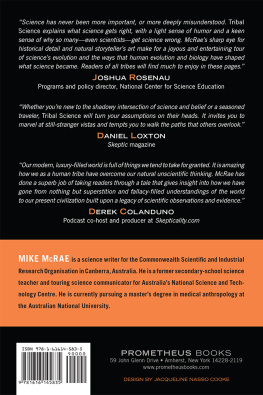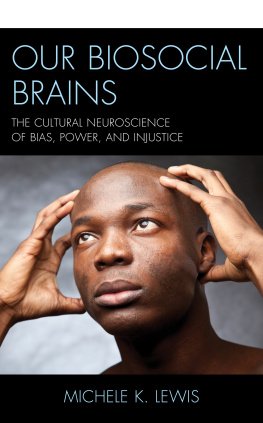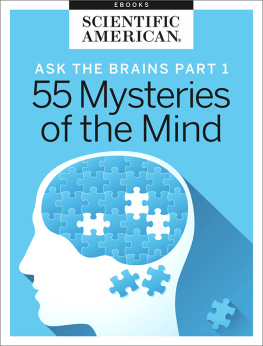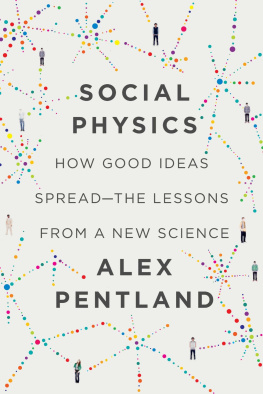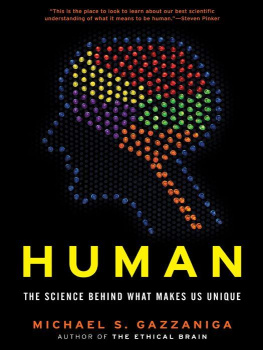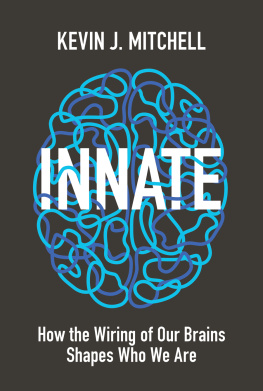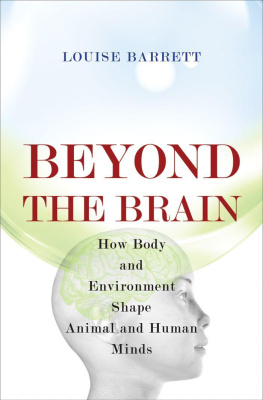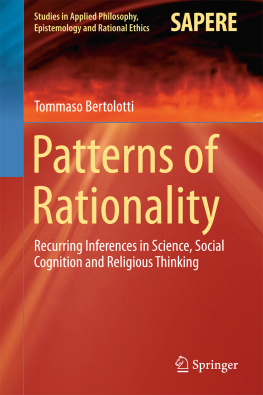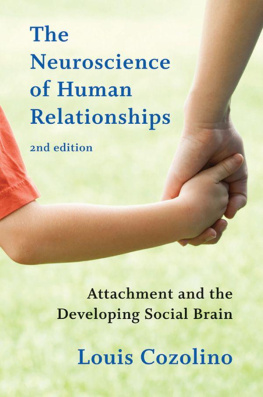Published 2012 by Prometheus Books
Tribal Science: Brains, Beliefs, and Bad Ideas. Copyright 2012 by Mike McRae. All rights reserved. No part of this publication may be reproduced, stored in a retrieval system, or transmitted in any form or by any means, digital, electronic, mechanical, photocopying, recording, or otherwise, or conveyed via the Internet or a website without prior written permission of the publisher, except in the case of brief quotations embodied in critical articles and reviews.
Cover design by Jacqueline Nasso Cooke
Inquiries should be addressed to
Prometheus Books
59 John Glenn Drive
Amherst, New York 142282119
VOICE: 7166910133
FAX: 7166910137
WWW.PROMETHEUSBOOKS.COM
161514131254321
Library of Congress Cataloging-in-Publication Data
McRae, Mike, 1977
Tribal science : brains, beliefs, and bad ideas / Mike McCrae.
p. cm.
Includes bibliographical references and index.
ISBN 9781616145835 (pbk. : alk. paper)
ISBN 9781616145842 (ebook)
1. ScienceSocial aspectsHistory. 2. Human behavior. 3. Social psychology.
I. Title.
Q175.46.M37 2012
303.48'309dc23
2012000380
Printed in the United States of America on acid-free paper.
For Asher

Chapter 1. The Storytelling Monkey
Why do we see faces in clouds?
Chapter 2. The Creative Serpent
Where did science come from?
Chapter 3. The Pitiful Monster
Why do doctors wear white coats?
Chapter 4. The Logical Alien
Why are we so unreasonable?
Chapter 5. The Clever Horse
What is this thing called evidence?
Chapter 6. The Science Graveyard
Why do we hold onto bad ideas?
Chapter 7. The Tangled Web
Who is in control of what we know?
Chapter 8. The Progressive Human
What will intelligence mean in the future?

I spent Christmas 2004 at a seaside town in the English region of Cornwall. The damp British winter had kept the beaches rather quiet, providing solitude perfect for losing myself in thought. One memory that remains with me is a late afternoon stroll by the cliffs, the fading sun bleeding into the landscapes muted colors while a flock of tiny birds rode the air currents that spilled invisible and silent against the rocks. There was a distinctive edge to the flocks formation, as if it was a giant amoeba that moved by stretching out an immense arm and dragging itself across the sky in a panic before concentrating into a teardrop. It wasnt a clump formed by hundreds of individualsfrom my position, it operated as if it was a single animal with one mind.
Ive always been fascinated by the behavior of swarms, hives, flocks, schools, colonies and communities. To think the anatomy of a bee is fundamentally suicidal, sacrificing the life of an individual for the sake of saving its colony. Social insects with nervous systems so simple are capable of great feats of computation in foraging and construction, providing us with novel ways to model communication networks for optimal traffic.
Yet when I take a moment to consider it, my fascination with collective behavior and swarm intelligence comes down to a rather arbitrary delineation of units. I dont think of my bodys cells as individual entities, myself as an ecosystem or metropolis of single-celled organisms. In some ways, however, I can consider myself as more or less a super-colony of membrane-enclosed bodies cooperating as discrete components. Somewhere in my brain a line is drawn around the outside of my skin, marking that boundary as a defining limit of me as one rather than many.
We readily consider a single bacterial cell to be an individual, while a colony of identical bacteria isnt. Only once cells adopt specific roles, with some forming a protective boundary while others adopt functions responsible for digestion, synthesis or reproduction, does the collective begin to take on the attributes of an individual. On the other hand, bees with physiological and behavioral differences within their hive dont make us view the hive as an individual. The fact a single insect can fly away forces us to define it as an independent organism. But the cells of a sea sponge can migrate throughout its body and change jobs, and entire sections of sponge can break away and settle elsewhere to grow. Is a single sponge a colony, or a discrete animal?
It might seem rather pedantic to give this much thought, but when it comes to understanding behaviorespecially that of humansthe innate biases we hold about the concept of social thinking and respect for our state of individuality can lead us astray. Were so hung up on defending free will and theory of mind that the idea of being influenced by the collective to any significant extent feels somewhat heretical, especially in cultures that celebrate the rights of individual freedom. Its easy to see hive-like behavior in others, of course...but never ourselves.
But to what extent are we isolated from other minds? How much control do we have over our ideas, our thoughts and our beliefs?
We are all products of our own collectives, our own tribes. Thats not to say were at the complete mercy of external cognitive forces.
But how we behave as individuals cant easily be teased out of the context of a collective either. We are tribal animals.
In todays post-industrial, westernized world, many of us belong to dozens of tribes that each exerts pressure on how we think and make decisions. I was born into a tiny tribe that consisted of my parents, and was later joined by a brother and sister. I found a place among the members of another tribe with friends during primary school and then again in high school. Work colleagues have welcomed me into their tribes here and overseas, as have fellow travelers I met while living in London and touring Europe. I have been an authority for the tribes of students I taught; a faceless member of the digital tribes of online forums and bulletin boards... each tribe different in values and beliefs, influencing how I think and act.
Somehow, out of that mess of shared stories, in-jokes, language variations and values, our vision of the world is formed. That human collage can make the difference between accepting that the Earth was made in seven days by the whim of God or over millions of years by impersonal laws of nature. Our tribal knowledge influences our trust in the scientist, the priest, the politician or the celebrity who tells us the globe is warming, vaccinations are unsafe, mobile phones give you cancer or Bill Clinton is really a reptilian alien in disguise.
This book is about ideas and how they develop: not just inside one brain, but from numerous brains working together as a collective. I look at how the brain evolved to help us survive an ever-changing world as cohesive communities, and how its functions bind us together in tribes using meaningful stories about the world to allow us to better face adversity together rather than on our own.
Our nervous systems ability to transfer and receive information with others in our community is what allows us to determine who is friend and who is stranger, what is safe and what is dangerous. Yet somewhere in that process of exchange, a culture has emerged that values a critical comparison of ideas in light of diverse observations. This methodologywhat we describe today as scienceallows us to prioritize ideas that are likely to be useful in making predictions. Armed with this future sight we have imagined possibilities and made them a reality. Driven by a desire for comfort and an aversion to pain and loss, we can invent ways to change our environment that no other organism is capable of.

